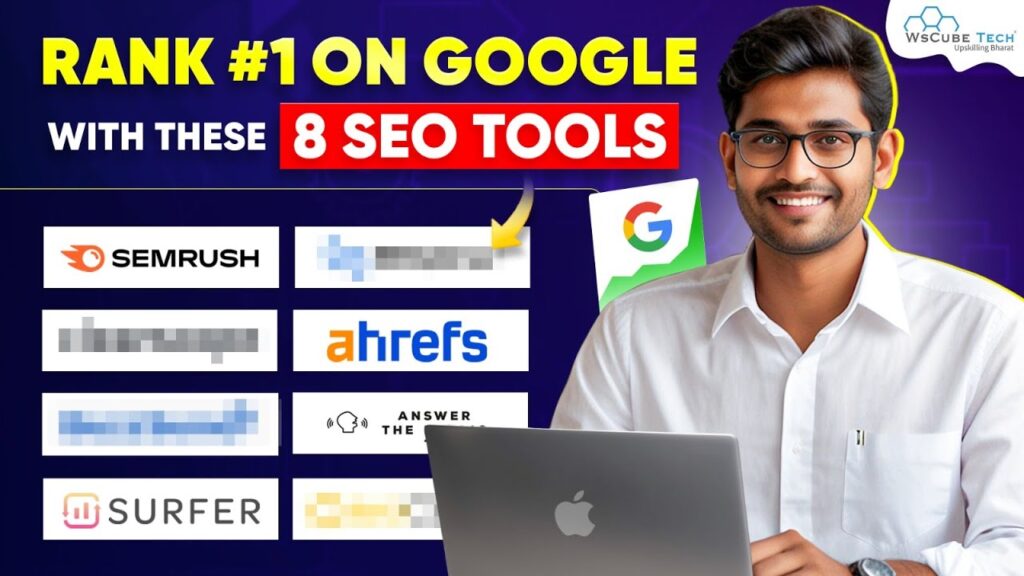8 Best SEO Tools to Rank #1 on Google in 2024 (Most are FREE!)
Top SEO Tools to Boost Your Business and Enhance Productivity Hello and welcome, friends! I am Karan Singh, and today I bring you an exciting lineup of tools designed to boost your work efficiency and help you grow your business. So, let’s dive straight into our computer screen and explore these amazing tools. 1. SEO Clarity: The All-in-One SEO Solution The first tool on our list is SEO Clarity, a comprehensive solution for all your SEO needs. This platform excels in keyword research, competitive analysis, and content generation. By scrolling through its features, you’ll discover functionalities such as AI-driven content insights, header tag analysis, and keyword suggestions. It even allows you to analyze search volume, keyword difficulty, and much more. SEO Clarity simplifies managing your content and optimizing your SEO strategies, ensuring your website ranks higher on search engines. If you’re looking for an all-encompassing tool to handle everything from keyword research to content performance, SEO Clarity is a must-try. 2. SEMrush: Dive into Competitor Analysis Next up is SEMrush, a powerful tool for competitor analysis. With SEMrush, you can identify the keywords your competitors use but you haven’t targeted yet, as well as the ones you both share. Its dashboard provides detailed insights, such as: By auditing your backlinks and assessing their quality (e.g., no-follow or do-follow), SEMrush helps you maintain a healthy backlink profile. It’s an excellent tool for refining your strategies and staying ahead of the competition. 3. SEO Optimer: Website Auditing Made Simple For those focused on website health, SEO Optimer is the tool to use. A site audit reveals SEO-related issues and provides actionable recommendations to improve rankings and visibility. Key features include: SEO Optimer categorizes recommendations by priority, allowing you to address the most critical issues first. The tool also evaluates social media engagement and overall performance, providing a holistic view of your website’s health. 4. Ahrefs: Industry-Leading SEO Tool Ahrefs is another top-tier SEO tool known for its user-friendly interface and detailed data analysis. It offers a variety of free and paid tools, including: Ahrefs provides comprehensive reports on keyword difficulty, search volume, and related keywords. Its keyword generator is particularly helpful for brainstorming content ideas, while its backlink audit ensures you build a solid and spam-free link profile. 5. Copyscape: Content Grading and Optimization When it comes to content optimization, Copyscape shines. It evaluates your content’s readability score, keyword consistency, and relevance to user intent. By providing insights into keyword placement and density, Copyscape ensures your content appeals to both readers and search engines. 6. Drop.com: Convert Content into Videos A unique addition to this list is Drop.com, which enables you to transform written content into engaging video content. Whether you’re converting a blog post into a video or extracting text from a video for an article, this tool is invaluable for diversifying your content strategy. 7. Ubersuggest: A Neil Patel Creation Ubersuggest, developed by Neil Patel, is a well-known SEO tool that specializes in keyword research, competitor analysis, and content optimization. It offers keyword visualization and suggests high-traffic, low-competition keywords to improve your ranking potential. Ubersuggest also integrates with Answer the Public, a tool designed to provide question-based keyword suggestions. For example, if you search for “Travel Goa to Mumbai,” it generates question-based keywords like “How to travel from Goa to Mumbai by train?” or “Best way to travel Mumbai to Goa.” These insights are essential for crafting user-focused content. 8. Answer the Public: Intent-Based Keyword Suggestions Another fantastic tool is Answer the Public, which organizes keyword suggestions based on user intent, such as questions, prepositions, and comparisons. It highlights keywords with high search volume and helps you create content that directly addresses user queries. Why These Tools Are Essential for SEO and Content Strategy By integrating these tools into your workflow, you can: Final Thoughts These SEO tools are invaluable for anyone looking to optimize their website, enhance content strategies, and stay competitive. Whether you’re a beginner or an expert, there’s a tool here that fits your needs. Experiment with a combination of these tools to see which works best for your specific goals. If you found this article informative, don’t forget to share it with your peers. Comment below with your favorite SEO tool or suggest topics you’d like us to cover in the future. Let’s boost our skills and take our SEO game to the next level!


